Alomost 30% of websites hosted in the whole world are using WordPress technologies. All the hackers and Spammers are keeping find new hacking technologies to hack WordPress websites, The WordPress Core software keep updating all times.
WordPress Websites are Under attacks
But because WordPress is an open-source Content Management System with that nature makes its codes visible and almost accessible to any user. As a result, it has become the prime target for most hackers who want to steal sensitive user information.
The Sucuri report disclosed that 55% WordPress Installation were out of date, and 74% of WordPress websites are prone to cyber attacks , and the top three plugins affecting that platform are Gravity Forms, TimThumb, and RevSlider.
In Jan 2017, The wpsanity website reported the WordPress Plugins and themes are under attack. Millions of attacks have been blocked.
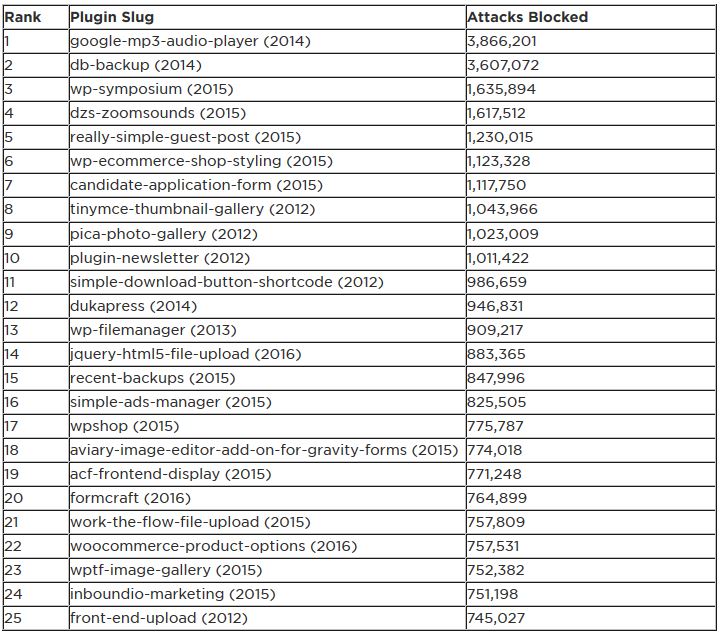
Possible Plugins attacks.
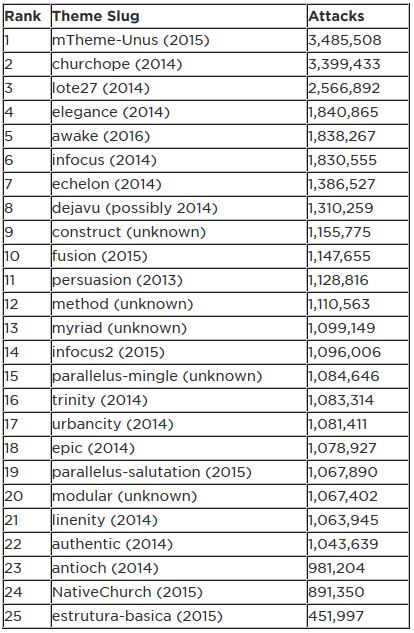
possible Theme Attacks
Types of Attacks Of WordPress Websites
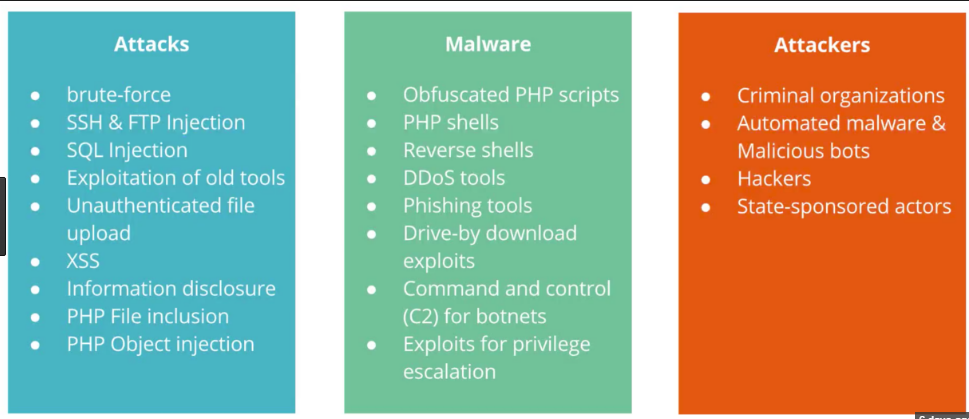
One of the main attacks you’ll hear about are brute-force attacks. This is where a bad guy uses a dictionary to try and constantly guess a password through thousands of login attempts. Once (and if) they log in, they’ll do something like put ads or something on your site so they can make money off your hacked site.
SSH and FTP injections are a common malware that plagues WordPress. This is where an attacker brute-forces a service and once they get in, they will find all PHP files and embed PHP code in there to mess your site up.
Exploitation of old tools refers to when web developers will leave a tool on a blog they were using to do some sort of operation. There are several tools out there that have been exploited to inject ads and things like that because they expose access to the database.
Unauthenticated file upload is exactly what it sounds like — a bad guy can upload anything…for instance, malicious PHP scripts that try to take over the web server.
XSS (cross site scripting) is where unsanitized input can be exploited to embed malicious JavaScript into any page.
WordPress is largely attacked by 3 kinds of hackers:
Humans – Unethical hackers with prowess in web and coding who break into WordPress websites to steal personal information.
- Bots – Automated hacker programs that either steal information or inject malicious codes into systems and networks that jeopardize their functioning.
- Botnets – a group of bots working together as a network controlled by a Command & Control (C&C) server that attacks websites in a systematic way causing issues like DDoS (Distributed Denial of Service).
Why the hackers want to hack your wordpress websites
There are a lot of reasons if the kackers kacked your websites, the main reasons is money. The hackers want to earn money from your websites and beat their competitors. As technology gradually becomes more sophisticated and integrated into our daily lives, the reason and motivations for hackers to access your personal and private information also exponentially increases.
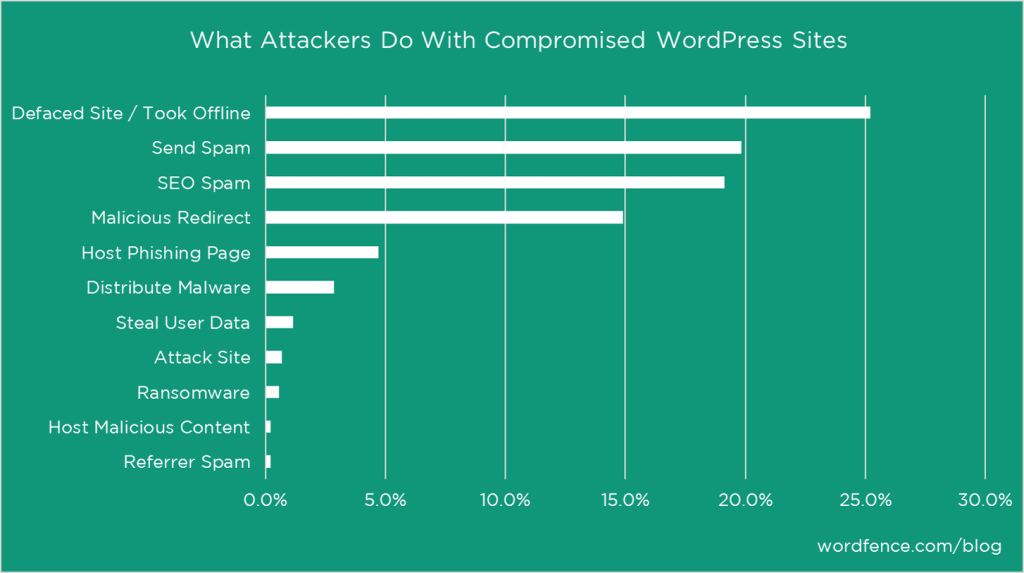
Why hackers hack your WordPress websites
The purposes behind WordPress website attacks constantly revolve around taking website offline, spreading spam, SEO spamming, malicious redirect, hosting phishing pages, hosting malicious content, distributing Malware, website data stealing, attacking other websites, ransomware, and referrer spam.
Offline Websites: In some cases hackers replace your content with their own. The most common was political content from terrorist groups and the like. The next most common was hackers simply bragging that they hacked your site. In all of these cases the attacker is doing absolutely nothing to obscure what they have done, anyone who visits the site immediately knows that you’ve been hacked.
Spam Sending: Spam emails containing phishing links or forms are sent in bulk numbers to the targeted audience of the website.
SEO Spam: There are a number of ways attackers can leverage your website to improve their search engine rankings. The first is to simply host pages on your domain, accruing the benefits of your Domain Authority and clean reputation.
malicious redirect: A malicious redirect sends a user to a malicious website. In 2010, 42,926 new malicious domains were detected. In 2011, this number grew to 55,294. And that just includes primary domains, not all of their subdomains. Redirects are an incredibly effective way for attackers to funnel traffic to malicious websites. The unsuspecting user doesn’t have to click on a hyperlink or advertisement for it to work, they are taken there directly.
How to prevent the Hacking of WordPress Websites
From Tony’s experience at Sucuri Security, the most common vulnerabilities to website exploits are:
- Out of date software,Poor credential management
- Poor system administration,
- Soup-kitchen servers,
- Lack of Web knowledge,
- Corner-cutting.
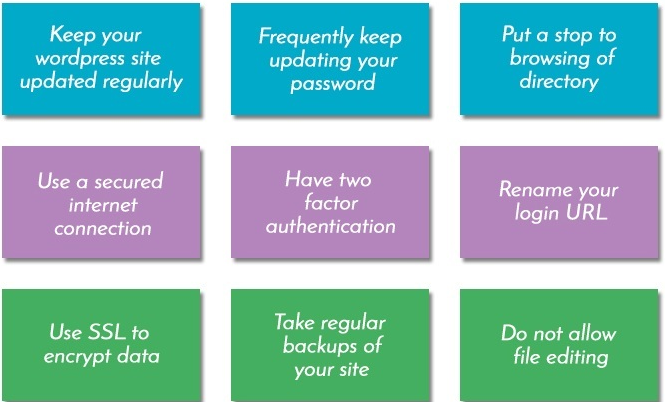
You must keep your WordPress website update in time to prevent being hacked. The updating will include both plugins and themes. It is the Top One important thing for you to run a WordPress Website. You can also have a good management habits to keep your WordPress Website security. Frequently updating your password, put a stop to browsing of directory, use a Secured Internet Connection, to have two factor authentication, rename your login URL, Use SSL to encrypt data, take regular backups of your site, do not allow file editing.
All above methods can be done by your editing htaccess file or install plugins or secure themes except SSL.
Why I Should Use SSL to Secure WordPress Websites ?
WordPress recently announced that it will require all hosts to have HTTPS and restrict certain WordPress features to sites that have a valid SSL certificate. SSL basically means the link between your browser and the server is encrypted. SSL is the fastest way and effective way to secure your website.
An SSL (Secure Sockets Layer) certificate is a digital certificate that authenticates the identity of a website and encrypts information sent to the server using SSL technology. Encryption is the process of scrambling data into an undecipherable format that can only be returned to a readable format with the proper decryption key. A certificate serves as an electronic “passport” that establishes an online entity’s credentials when doing business on the Web. When an Internet user attempts to send confidential information to a Web server, the user’s browser accesses the server’s digital certificate and establishes a secure connection.
An SSL certificate contains the following information:
- The certificate holder’s name
- The certificate’s serial number and expiration date
- A copy of the certificate holder’s public key
- The digital signature of the certificate-issuing authority
HTTPS adds a security layer to HTTP (Hypertext Transfer Protocol). HTTPS essentially encrypts data (using SSL or TSL) that is communicated between servers and clients until it reaches the intended recipient. Pushing for SSL encryption will help deal with customer concerns and also provide several other benefits:
Secure your customer data: Your data remains where it needs to be, intact and safe from hacker’s sight. SSL ensures that the data exchanged between a web browser and the server is not wholly available for hacking. The data is encrypted and broken down into pieces thus making hacking almost impossible.
Improves your keyword ranks in Google results: In 2014, Google suggested that enabling HTTPS on your site could result in higher search rankings. Web sites that want to be placed in the top search results must include SSL encryption to avoid being overlooked or flagged off as insecure by Google’s bots.
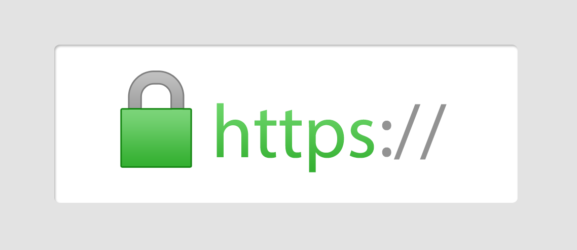
Increases Conversions: Studies have confirmed that SSL encryption can ultimately lead to increased conversion rates. Customers feel safe to transact with a WordPress website that is insulated from cyber attacks. This proves to be highly beneficial for eCommerce websites where online payment integrates are commonplace. A secure connection can make all the difference from a user’s perspective. Users see HTTPS as a positive signal that you are taking your site security seriously, for their benefit. So, having HTTPS could mean more traffic and longer usage times on your site.
Where to get HTTPS ?
Click following picture to get your Standard SSL certificate from Powerhoster.
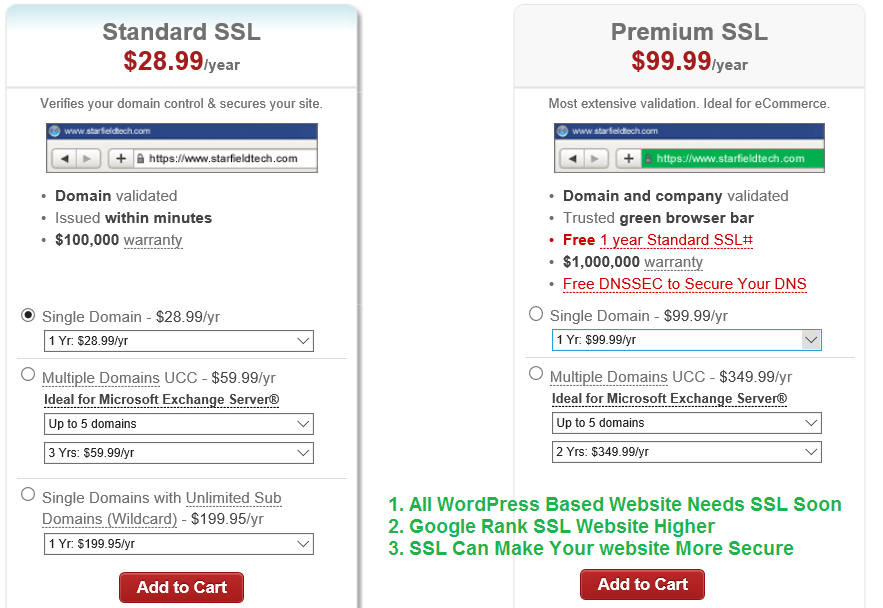
We also provide Premium SSL certificate. You can secure your managed WordPress website with just a single click. You can get 15% Discount by clicking following link Discount Premium SSL Certificate If you want to buy two more years.

Hi
Great information but you also need to enable HSTS to prevent ‘Man in the middle attack’ as hackers can still get around SSL. With it enabled they can’t.
On Qualys SSL Labs you can then score A+ but without HSTS enabled you only get an A.
Colin